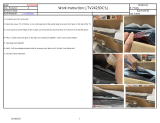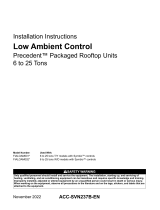
SAFETY WARNING
Only qualified personnel should install and service the equipment. The installation,
starting up, and servicing of heating, ventilating, and air-conditioning equipment
can be hazardous and requires specific knowledge and training. Improperly
installed, adjusted or altered equipment by an unqualified person could result in
death or serious injury. When working on the equipment, observe all precautions
in the literature and on the tags, stickers, and labels that are attached to the
equipment.
132
45 6
©2023 Trane
Installation Instructions
Symbio™ 500 Pre-programmed for
RTU or Heat Pumps
Order Number: BMSY500ABA0100011
Warnings, Cautions, and Notices
Read this manual thoroughly before operating or servicing this unit. Safety
advisories appear throughout this manual as required. Your personal safety and
the proper operation of this machine depend upon the strict observance of these
precautions.
Important Environmental Concerns
Scientific research has shown that certain man-made chemicals can affect the
earth’s naturally occurring stratospheric ozone layer when released to the
atmosphere. In particular, several of the identified chemicals that may affect the
ozone layer are refrigerants that contain Chlorine, Fluorine and Carbon (CFCs)
and those containing Hydrogen, Chlorine, Fluorine and Carbon (HCFCs). Not all
refrigerants containing these compounds have the same potential impact to the
environment. Trane advocates the responsible handling of all refrigerants.
Important Responsible Refrigerant Practices
Trane believes that responsible refrigerant practices are important to the
environment, our customers, and the air conditioning industry. All technicians
who handle refrigerants must be certified according to local rules. For the USA,
the Federal Clean Air Act (Section 608) sets forth the requirements for handling,
reclaiming, recovering and recycling of certain refrigerants and the equipment
that is used in these service procedures. In addition, some states or
municipalities may have additional requirements that must also be adhered to for
responsible management of refrigerants. Know the applicable laws and follow
them.
The three types of advisories are defined as follows:
WARNING Indicates a potentially hazardous situation which, if
not avoided, could result in death or serious injury.
CAUTION Indicates a potentially hazardous situation which, if
not avoided, could result in minor or moderate injury.
It could also be used to alert against unsafe practices.
NOTICE Indicates a situation that could result in equipment or
property-damage only accidents.
WARNING
Proper Field Wiring and Grounding Required!
Failure to follow code could result in death or serious injury. All field wiring MUST
be performed by qualified personnel. Improperly installed and grounded field
wiring poses FIRE and ELECTROCUTION hazards. To avoid these hazards, you
MUST follow requirements for field wiring installation and grounding as described
in NEC and your local/state/national electrical codes.
WARNING
Personal Protective Equipment (PPE) Required!
Failure to wear proper PPE for the job being undertaken could result in death or
serious injury. Technicians, in order to protect themselves from potential
electrical, mechanical, and chemical hazards, MUST follow precautions in this
manual and on the tags, stickers, and labels, as well as the instructions below:
• Before installing/servicing this unit, technicians MUST put on all PPE required
for the work being undertaken (Examples; cut resistant gloves/sleeves, butyl
gloves, safety glasses, hard hat/bump cap, fall protection, electrical PPE and
arc flash clothing). ALWAYS refer to appropriate Safety Data Sheets (SDS) and
OSHA guidelines for proper PPE.
• When working with or around hazardous chemicals, ALWAYS refer to the
appropriate SDS and OSHA/GHS (Global Harmonized System of Classification
and Labeling of Chemicals) guidelines for information on allowable personal
exposure levels, proper respiratory protection and handling instructions.
• If there is a risk of energized electrical contact, arc, or flash, technicians MUST
put on all PPE in accordance with OSHA, NFPA 70E, or other country-specific
requirements for arc flash protection, PRIOR to servicing the unit. NEVER
PERFORM ANY SWITCHING, DISCONNECTING, OR VOLTAGE TESTING
WITHOUT PROPER ELECTRICAL PPE AND ARC FLASH CLOTHING. ENSURE
ELECTRICAL METERS AND EQUIPMENT ARE PROPERLY RATED FOR
INTENDED VOLTAGE.
Copyright
This document and the information in it are the property of Trane, and may not
be used or reproduced in whole or in part without written permission. Trane
reserves the right to revise this publication at any time, and to make changes to
its content without obligation to notify any person of such revision or change.
Trademarks
All trademarks referenced in this document are the trademarks of their respective
owners.
Storage/Operating Specifications
WARNING
Follow EHS Policies!
Failure to follow instructions below could result in death or serious injury.
• All Trane personnel must follow the company’s Environmental, Health and
Safety (EHS) policies when performing work such as hot work, electrical, fall
protection, lockout/tagout, refrigerant handling, etc. Where local regulations
are more stringent than these policies, those regulations supersede these
policies.
• Non-Trane personnel should always follow local regulations.
Storage
Temperature: -67°F to 203°F (-55°C to 95°C)
Relative Humidity: Between 5% to 95% (non-condensing)
Operating
Temperature: -40°F to 158°F (-40°C to 70°C)
Humidity: Between 5% to 95% (non-condensing)
Power: 20.4 to 27.6 Vac (24 Vac, ±15% nominal) 50 to 60 Hz, 24 VA
For specifics on transformer sizing, see BAS-SVX090*-EN.
Mounting Weight of Controller: Mounting surface must support 0.80lb. (0.364 kg)
Environmental Rating
(Enclosure): NEMA 1
Plenum Rating Not plenum rated
Dimensions/Mounting/Removing Symbio 500
To mount device:
1. Hook device over
top of DIN rail.
2. Gently push on
lower half of
device in the
direction of arrow
until the release
clip clicks into
place.
To remove/reposition device:
1. Disconnect all connectors before removing or
repositioning.
2. Insert screwdriver into slotted release clip and
gently pry upward with the screwdriver to
disengage the clip.
3. While holding tension on the clip, lift device upward
to remove or reposition.
4. If repositioned, push on the device until the release
clip clicks back into place to secure the device on
the DIN rail.
Slotted release clip shown
from back side
NOTICE
Enclosure Damage!
Failure to follow instructions below could result in damage to the plastic enclosure. Do not use
excessive force to install the controller on the DIN rail. If using another manufacturer’s DIN rail, follow
their recommended installation.
WARNING
Hazardous Voltage!
Failure to disconnect power before servicing could result in death or serious injury.
Disconnect all electric power, including remote disconnects before servicing. Follow proper
lockout/tagout procedures to ensure the power can not be inadvertently energized. Verify that no
power is present with a voltmeter.
WARNING
Proper Ground Connection Required!
Failure to follow instructions below could result in death or serious injury.
After installation, ensure that the 24 Vac transformer is grounded through the controller. Measure the
voltage between chassis ground and any ground terminal on the controller. Expected result: Vac <4.0
volt.
2.37 in.
(60.1 mm)
1.89 in.
(48 mm)
4.00 in.
(101.6 mm)
End View
1.79 in.
(45.4 mm)
Communication Link Wiring
The Symbio™ 500 controller communicates with the building automation system
(BAS) and with other controller over a BACnet® MS/TP, BACnet/IP, or Air-Fi
Wireless communication link.
Important: BACnet MS/TP link wiring must be field-supplied and installed in
compliance with NEC and local codes.
For instructions on BACnet MS/TP communication wiring, refer to the Unit
Controller Wiring For the Tracer® SC+ System Controller Wiring Guide
(BAS-SVN03*-EN).
A/C Power Wiring
Prior to connecting AC power to the controller:
• All wiring must comply with National Electrical Code™ (NEC) and local
codes.
• The recommended wire for AC power is 16 AWG copper wire, minimum.
• Refer to “Transformer Recommendations”.
NOTICE
Enclosure Damage!
Failure to follow instructions below could result in damage to the plastic enclosure. Do
not use excessive force to install the controller on the DIN rail. If using another
manufacturer’s DIN rail, follow their recommended installation.
WARNING
Hazardous Voltage!
Failure to disconnect power before servicing could result in death or serious injury.
Disconnect all electric power, including remote disconnects before servicing. Follow
proper lockout/tagout procedures to ensure the power can not be inadvertently
energized. Verify that no power is present with a voltmeter.
WARNING
Proper Ground Connection Required!
Failure to follow instructions below could result in death or serious injury.
After installation, ensure that the 24 Vac transformer is grounded through the controller.
Measure the voltage between chassis ground and any ground terminal on the controller.
Expected result: Vac <4.0 volt.
Wiring Requirements
To ensure proper operation of the Symbio™ 500, install the power supply circuit
in accordance with the following guidelines:
• The Symbio 500 must receive AC power from a dedicated power circuit;
failure to comply may cause the controller to malfunction.
• A dedicated power circuit disconnect switch must be near the controller,
easily accessible by the operator, and marked as the disconnecting device
for the controller.
•DO NOT run AC power wires in the same wire bundle with input/output wires;
failure to comply may cause the controller to malfunction due to electrical
noise.
18 AWG copper wire is recommended for the circuit between the transformer and
the Symbio 500.
Transformer Recommendations
The Symbio™ 500 can be powered with 24 Vac. Use of a 24 Vac power supply
is recommended in order to use the spare 24 Vac outputs for powering relays and
TRIACs.
• AC transformer requirements: UL listed, Class 2 power transformer, 24 Vac
±15%, device max load 24 VA, BCI application 6 VA. The transformer must
be sized to provide adequate power to the Symbio 500 controller (12 VA) and
outputs (maximum 12 VA per binary output).
• CE-compliant installations: The transformer must be CE marked and SELV
compliant per IEC standards.
A separate transformer is recommended for each Symbio 500. The line input to
the transformer must be equipped with a circuit breaker sized to handle the
maximum transformer line current. If a single transformer is shared by multiple
Symbio 500s:
• The transformer must have sufficient capacity.
• Polarity must be maintained for every Symbio 500 powered by the
transformer.
NOTICE
Equipment Damage!
Sharing 24 Vac power between controllers could result in equipment damage.
June 2023 BAS-SVN234A-EN
The Symbio™ 500 controller is a pre-programmed field-installed device that
provides direct digital zone temperature control. It can operate as a stand-alone
device or as part of a building automation system (BAS) and control:
• 0/1/2-heat plus 0/1/2-cool rooftop unit.
• heat pump; 0/1/2 compressor plus auxiliary heat (optional).
Visually inspect contents for obvious defects or damage. All components have
been thoroughly inspected before leaving the factory. Any claims for damage
incurred during shipment should be filed immediately with the carrier.
X13651779001




